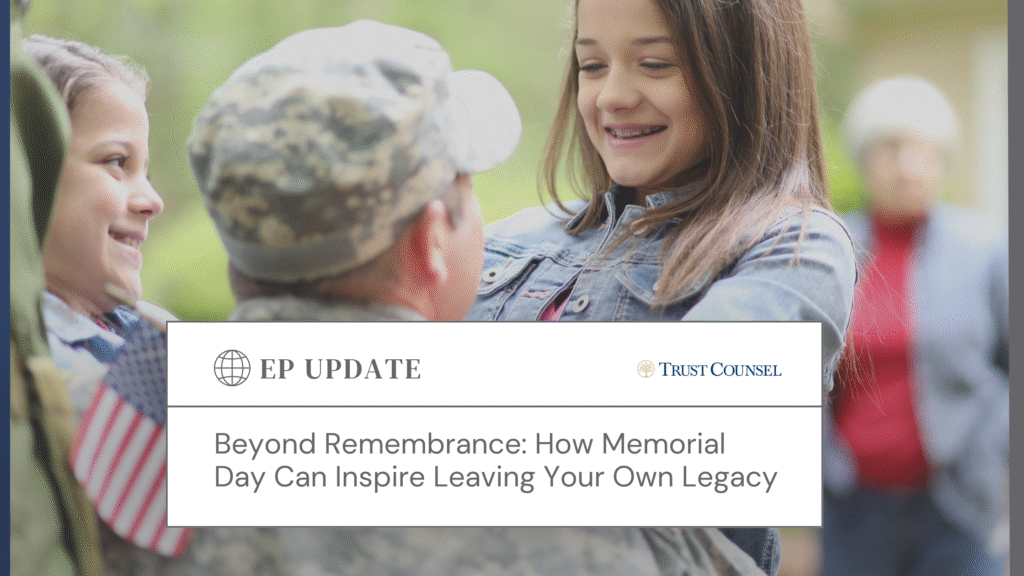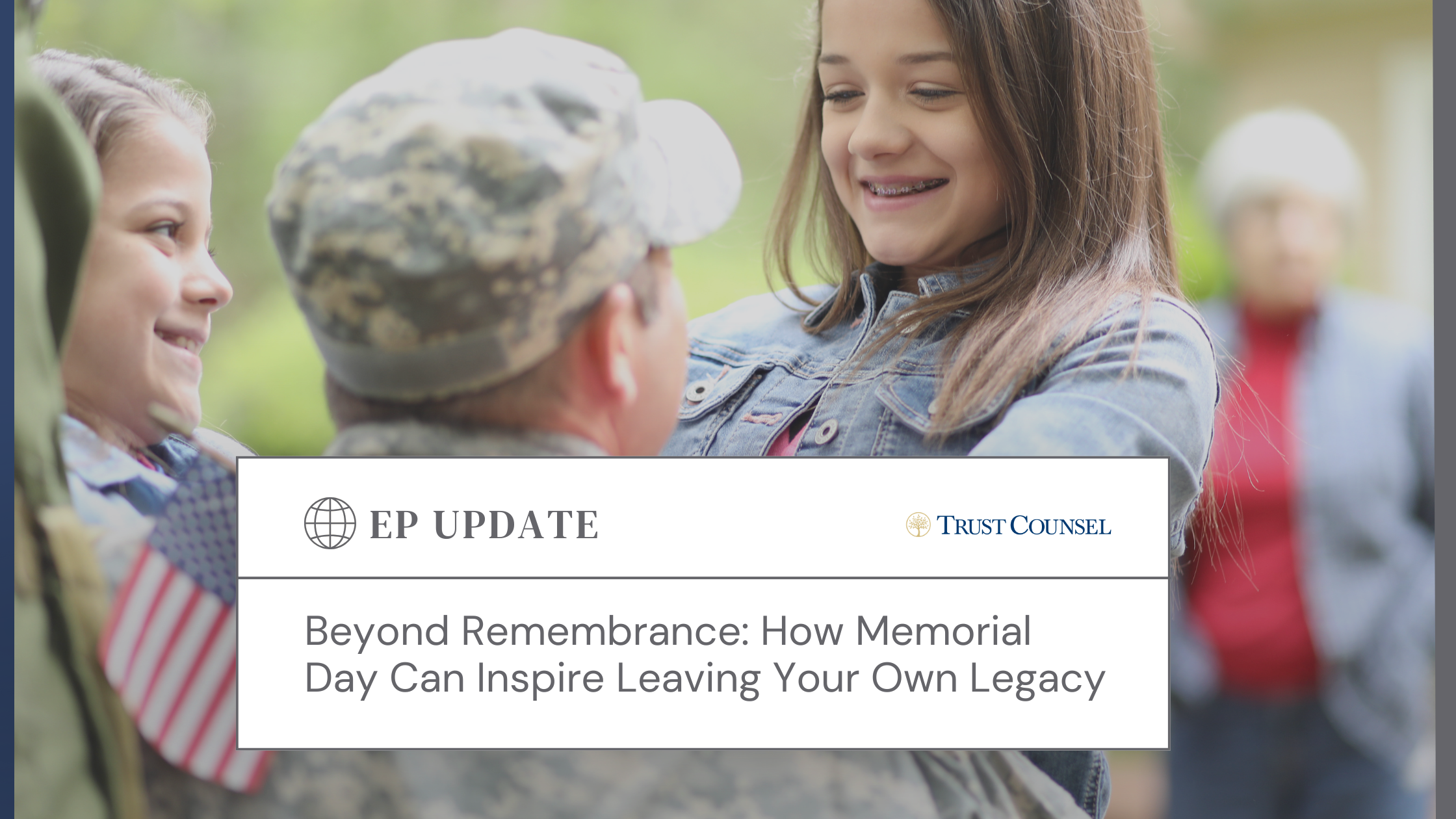Memorial Day legacy planning isn’t just about barbeques or pool parties—it’s about taking inspiration from sacrifice to build your own meaningful estate plan. It’s a day to collectively pause and honor the brave men and women who made the ultimate sacrifice for our freedom and security.
As flags wave at half-staff and solemn ceremonies unfold across the country, this day of remembrance naturally guides our thoughts toward our own mortality and the legacies we desire to leave behind.
Memorial Day offers us a meaningful opportunity to consider how estate planning serves as more than just a legal formality—it’s a heartfelt expression of our deepest values, a bridge connecting past, present, and future generations, and a promise to not leave a mess for the people you love.
The Deeper Meaning of Estate Planning
Estate planning—the unique form of planning that helps you pass on not just material wealth but the richness of your lived experience and personal philosophy—ensures that your loved ones receive their inheritance from you without becoming trapped by an overburdened legal system or losing assets you worked hard to create. This is worth so much more to them than a stack of documents you create. That’s what legacy is about.
The soldiers we honor on Memorial Day understood the profound importance of legacy. Their sacrifices weren’t merely for the present but for a future they would never see—a powerful reminder that our actions today ripple forward in time, shaping lives beyond our own. Their example challenges us to consider: what values and memories do we wish to preserve? How can we ensure that what matters most to us continues to influence and inspire our loved ones? How can we leave a legacy of love instead of complication and confusion?
While most of us won’t leave legacies as dramatically visible as those of fallen heroes, the impact we make through thoughtful estate planning can be equally meaningful within the intimate circle of our families and communities.
Your estate plan becomes a final expression of your life’s narrative—a way to communicate what you stood for, what you cherished, and what you hope lives on through those you leave behind.
Military Heirlooms and Service Records: Preserving Tangible History
For families with military connections, Memorial Day carries special significance that can directly inform your estate planning approach. Military heirlooms—medals, uniforms, letters from the battlefield, and photographs—represent more than sentimental keepsakes; they embody personal and national history deserving of careful preservation. These items tell stories of courage and sacrifice that can inspire future generations, but without proper planning, they risk being lost, damaged, or their significance forgotten.
Estate planning done right provides the mechanism to ensure these treasures receive the reverence they deserve. You might consider creating detailed inventories of military memorabilia, complete with the stories behind each item. Who earned that Purple Heart? What battles did your grandfather fight in? What was life like during wartime? These narratives transform objects into living history and should be documented alongside your formal legacy planning documents.
Service records, too, form a critical part of this legacy planning. Veterans have access to specific benefits and protections that should be incorporated into comprehensive estate planning.
More importantly, preserving service records and perhaps even recording oral histories ensures that these chapters of family history—often characterized by remarkable courage and sacrifice—aren’t lost to time.
When you work with us, we can help identify the best approaches to preserving these irreplaceable elements of your family’s story.
Estate Planning as a Process for Everyone
One of the most persistent misconceptions about estate planning is that it’s only relevant for the wealthy or elderly. In truth, estate planning is an inclusive process relevant to everyone, regardless of age or financial status. Just as Memorial Day is a national observance that touches all Americans, estate planning is a universal need that crosses demographic boundaries.
Think about it this way: we all have values we believe in, people we love, and stuff we are leaving behind. Even if you don’t own extensive property or investments, you will either leave behind clear guidance and direction or a confusing jumble of uncertainty. You get to choose by the actions you take now. For parents of young children, your estate plan must include a Kids Protection PlanⓇ to ensure your children are raised by the people you choose, according to your values.
For mid-career professionals, it might center on protecting what you’ve built and establishing frameworks for future growth.
For those in retirement, the emphasis might shift toward living the last years of your life as you choose, with dignity.
At every stage, estate planning serves as a vehicle for expressing what matters most to you, making wise choices about your resources and ultimately leaving the world better than you found it.
Beyond Material Assets to Leaving a Legacy
When we meet with you, we’ll help you reflect on your family dynamics and your assets, and what will happen to everything you care about if you become incapacitated or when you die. As a result, you may realize that material possessions pale in comparison to your guidance and clear communication about your wishes.
As part of our estate planning methodology, we help you create a recording, where you directly communicate your beliefs, hopes, and life lessons to future generations.
You can even explain the significance of special possessions—why that military medal, family bible, or piece of jewelry means so much and why you’ve chosen certain people as the next caretaker.
From Reflection to Action: Taking the First Steps
Memorial Day serves as a poignant catalyst for action. The day’s emphasis on remembrance naturally evokes thoughts about how we wish to be remembered and what legacy we hope to leave. Rather than allowing these important reflections to fade as the holiday passes, use them as motivation to begin or update your estate planning journey.
Start by contemplating the values and memories you wish to preserve—this is often how to start estate planning and begin your legacy plan. What stories do you want your grandchildren to know? What principles have guided your life? What possessions hold special meaning that might not be apparent to others without explanation? Take time to document these thoughts, even informally at first.
Next, consider the practical aspects of your legacy. Who would care for your children if necessary? How would you want healthcare decisions handled if you couldn’t speak for yourself? Are there specific pieces of property—perhaps a family home, military memorabilia, or heirlooms—that require special consideration? How would your loved ones know what you have, where it is, and what to do with it? These questions form the foundation of comprehensive estate planning.
It’s Easy to Get Started
This Memorial Day, honor those who gave all—and take the first step in protecting your own legacy with a complimentary estate planning consult at Trust Counsel. Contact us to begin crafting your unique legacy plan—one that will ensure your values, wisdom, and love continue to shape the lives of those who follow in your footsteps. In doing so, you create your own memorial—not of stone or bronze, but of true consideration of the people who will care for you and everything you are leaving behind, when you can no longer. It’s easy to get started.
This article is a service of Trust Counsel, a Personal Family Lawyer® Firm. We don’t just draft documents; we ensure you make informed and empowered decisions about life and death, for yourself and the people you love. That’s why we offer a Family Wealth Planning Session™, during which you will get more financially organized than you’ve ever been before and make all the best choices for the people you love. You can begin by calling our office today to schedule a Family Wealth Planning Session™.
The content is sourced from Personal Family Lawyer® for use by Personal Family Lawyer® firms, a source believed to be providing accurate information. This material was created for educational and informational purposes only and is not intended as ERISA, tax, legal, or investment advice. If you are seeking legal advice specific to your needs, such advice services must be obtained on your own separate from this educational material.






